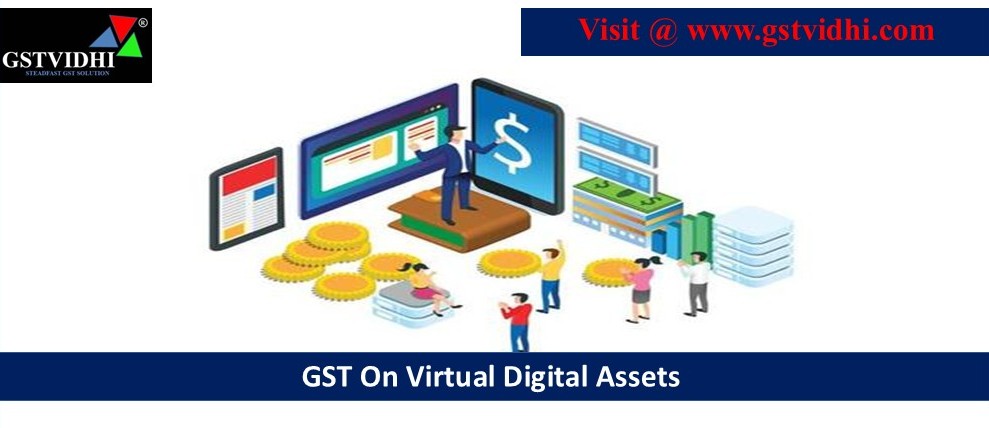
GST on Virtual Digital Assets / Taxability of VDA Transactions -
A Simplified Overview
In the digital age, the
rise of cryptocurrencies, NFTs (Non-Fungible Tokens), and other
blockchain-based assets has brought both innovation and legal complexity. In
India, these assets are broadly categorized as Virtual Digital Assets (VDAs).
While the Income Tax Act, 1961, provides some clarity on the direct tax
implications, the Goods and Services Tax (GST) treatment of VDAs remains
a dynamic and evolving space. This article aims to demystify the GST
implications of VDAs in a simple and professional manner.
What are
Virtual Digital Assets (VDAs)?
As per Section 2(47A) of
the Income Tax Act, VDAs include:
- Cryptocurrencies like Bitcoin,
Ethereum, etc.
- NFTs (Non-Fungible Tokens)
- Any digital asset notified by the
government
These are essentially digitally
represented assets that do not have legal tender status but hold
significant monetary value and can be traded, transferred, or held for
investment purposes.
Are VDAs
Goods or Services under GST?
Under GST law, all
supplies are taxed as either goods or services.
- Goods
are defined under Section 2(52) of the CGST Act as every kind of movable
property other than money and securities.
- Services
are defined under Section 2(102) as anything other than goods, money, and
securities.
Since VDAs do not fall
under the definition of money or securities, and are digitally transferred,
they are likely to be classified as “services” under the GST framework.
This aligns with the treatment of software, digital downloads, and similar
intangibles.
Taxability
of VDA Transactions
1. Trading of VDAs on
Platforms (Exchanges)
When VDAs are bought or
sold through an exchange, GST may apply on:
- Transaction fees
charged by the exchange
- Brokerage
or commission earned
- Wallet services
or custody fees
However, the buy/sell
value of the cryptocurrency itself may not attract GST unless clarified
otherwise. This is still a grey area and could be subject to interpretation by
authorities.
2. Peer-to-Peer Transfers
In direct transactions
between individuals (like person X sending Bitcoin to person Y), the issue of
GST arises if:
- One party is engaged in business or
trading of VDAs, and
- The transaction is for consideration
In such cases, GST
could apply if it qualifies as a supply made in the course of business.
3. Mining of
Cryptocurrencies
Cryptocurrency mining
involves validating transactions and earning crypto in return. As per GST law:
- If mining is done commercially,
the activity may be treated as a supply of service
- The value of supply would be the market
value of the crypto received
- GST would be applicable, and the
miner may be required to register
4. NFT Sales and
Royalties
NFT creators and
platforms may be liable to pay GST on:
- Initial sale
of NFTs (considered a service)
- Royalties
on secondary sales
- Platform fees
or commissions
This area is gaining
attention due to the increasing popularity of digital art and gaming NFTs.
Place of
Supply and GST Registration
For VDAs, especially
since the transactions are digital and may involve foreign buyers/sellers,
determining the place of supply becomes crucial. If a VDA service is
supplied to:
- An Indian recipient
– GST applies at the applicable rate
- A foreign recipient
– It could qualify as an export of service, provided all conditions
are met, and be zero-rated
GST registration may be
required if the supplier's turnover exceeds the threshold or if reverse charge
applies.
Reverse
Charge Mechanism (RCM)
If a foreign supplier
provides services related to VDAs (like a foreign crypto exchange or NFT
platform), then under Section 5(3) of the IGST Act, the Indian recipient may
be liable to pay GST under RCM.
GST Rate on
Virtual Digital Assets
Currently, there is no
specific GST rate prescribed for VDAs. However, by general principles, the
applicable rate on digital services is typically 18%. Until a formal
notification is issued, the standard rate of 18% may be applied on:
- Platform services
- Wallet or custody services
- Brokerage or commission
Challenges
in GST Implementation on VDAs
- Valuation:
Determining the fair market value of crypto assets, especially during
volatile periods.
- Cross-border complexities:
Transactions with offshore exchanges or users can raise legal and tax
issues.
- Lack of clarity:
Currently, there is no dedicated notification or circular from CBIC that
categorically outlines the GST treatment of VDAs.
Conclusion
The GST implications of
Virtual Digital Assets are complex and evolving. While they are generally
treated as services and taxed accordingly, several gray areas remain regarding
valuation, classification, and international transactions. As VDAs gain traction,
it is expected that the government will soon bring in comprehensive
guidelines to regulate and tax these digital innovations more clearly.
Disclaimer: All the Information is based on the notification, circular advisory and order issued by the Govt. authority and judgement delivered by the court or the authority information is strictly for educational purposes and on the basis of our best understanding of laws & not binding on anyone.
Click here